Need Help?
Announcements
26 January 2022
Welcoming Prof. Dr. Tadashi Dohi to the Editorial Board of Software
We are pleased to announce that Prof. Dr. Tadashi Dohi has joined Software (ISSN: 2674-113X) as an Editorial Board Member.
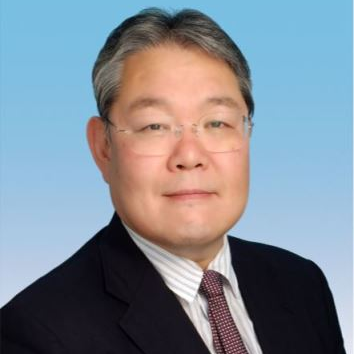
Dr. Tadashi Dohi has served as a Full Professor at Hiroshima University, Japan, since 2002. He is currently appointed as Dean of School of Informatics and Data Science and Associate Dean of Graduate School of Advanced Science and Engineering, Hiroshima University. He received a Doctor of Engineering degree from Hiroshima University in 1995.
His research interests include Software Reliability, Dependable Computing, Performance Evaluation, Operations Research. To date, his research has led to 260 journal papers, 320 peer-reviewed conference papers, 25 book editions, and 40 book chapters in the above research fields. Dr. Dohi is a Regular Member of the Institute of Electronics, Information and Communication Engineering (IEICE), Information Processing Society of Japan (IPSJ), Reliability Engineering Association of Japan (REAJ), a Fellow Member of the Operations Research Society of Japan (ORSJ), and a Senior Member of IEEE (Computer Society and Reliability Society). He was acting President of REAJ in 2018 and 2019.
He has served as the General Chair of 15 international conferences, including ISSRE 2011, ATC 2012, DASC 2019, and ICECCS 2022. Of note, he was a founding member of the International Symposium on Advanced Reliability and Maintenance Modeling (APARM) and International Workshop on Software Aging and Rejuvenation (WoSAR). He has been a steering committee member in AIWARM/APARM, ISSRE, DASC, DSA. He has worked as a program committee member in several international premier conferences such as DSN, ISSRE, COMPSAC, SRDS, QRS, EDCC, PRDC, HASE, SAC, ICPE, among numerous others. He is an Associate Editor/Editorial Board Member of over 20 international journals, including IEEE Transactions on Reliability, Asia-Pacific Journal of Operational Research, and Journal of Risk and Reliability.
13 January 2022
Prof. Dr. Pekka Abrahamsson and Prof. Dr. Tommi Mikkonen Appointed Founding Editors-in-Chief of Software
We are pleased to announce that Prof. Dr. Pekka Abrahamsson and Prof. Dr. Tommi Mikkonen have been appointed founding Editors-in-Chief of the new journal Software (ISSN 2674-113X, https://www.mdpi.com/journal/software).
|
|
Name: Prof. Dr. Pekka Abrahamsson |
Prof. Dr. Pekka Abrahamsson works as a full professor of information systems and software engineering at the University of Jyväskylä in Finland. He received his Ph.D. in software engineering in 2002 from the University of Oulu. Prior to his current position, he worked as a full professor at the Free University of Bozen Bolzano (Italy) and the Norwegian University of Science and Technology (Norway). His research interests are in empirical software engineering, software startups, emerging software technologies, and the ethics of artificial intelligence. He is widely recognized for his academic achievements. He is a pioneer in research on agile software engineering methods and processes. Prof. Dr. Abrahamsson is a member of the Finnish Academy of Science and Letters. Arnetminer named him among the 100 most influential software engineering scientists in the world in 2016. Prof. Dr. Abrahamsson was awarded the Nokia Foundation Award 2007. He is also the co-founder of the Software Startup Research Network (SSRN).
|
|
Name: Prof. Dr. Tommi Mikkonen |
Prof. Dr. Tommi Mikkonen is a full professor of software engineering at the University of Jyväskylä and a full professor of software systems at the University of Helsinki, both located in Finland. He received his Dr. Tech. in information technology in 1999 from Tampere University of Technology, Finland. In addition to his academic positions, he has been a principal scientist at Nokia and a visiting professor at Sun Microsystems Research and at Mozilla. His research interests include the IoT, software development methods, multi-device programming, and software engineering for AI. Prof. Dr. Mikkonen is a member of the Finnish Academy of Science and Letters, and he has acted as a board member of the Finnish Information Processing Association. He is the year 2017 Open World Hero, nominated by the Center of Open Source Software in Finland.
We warmly welcome Prof. Dr. Pekka Abrahamsson and Prof. Dr. Tommi Mikkonen as the founding Editors-in-Chief of Software and look forward to Software achieving many milestones under their leadership. For further information on the journal’s aim and scope, please visit https://www.mdpi.com/journal/software/about.
10 January 2022
Recruiting Topical Advisory Panel Members for Software
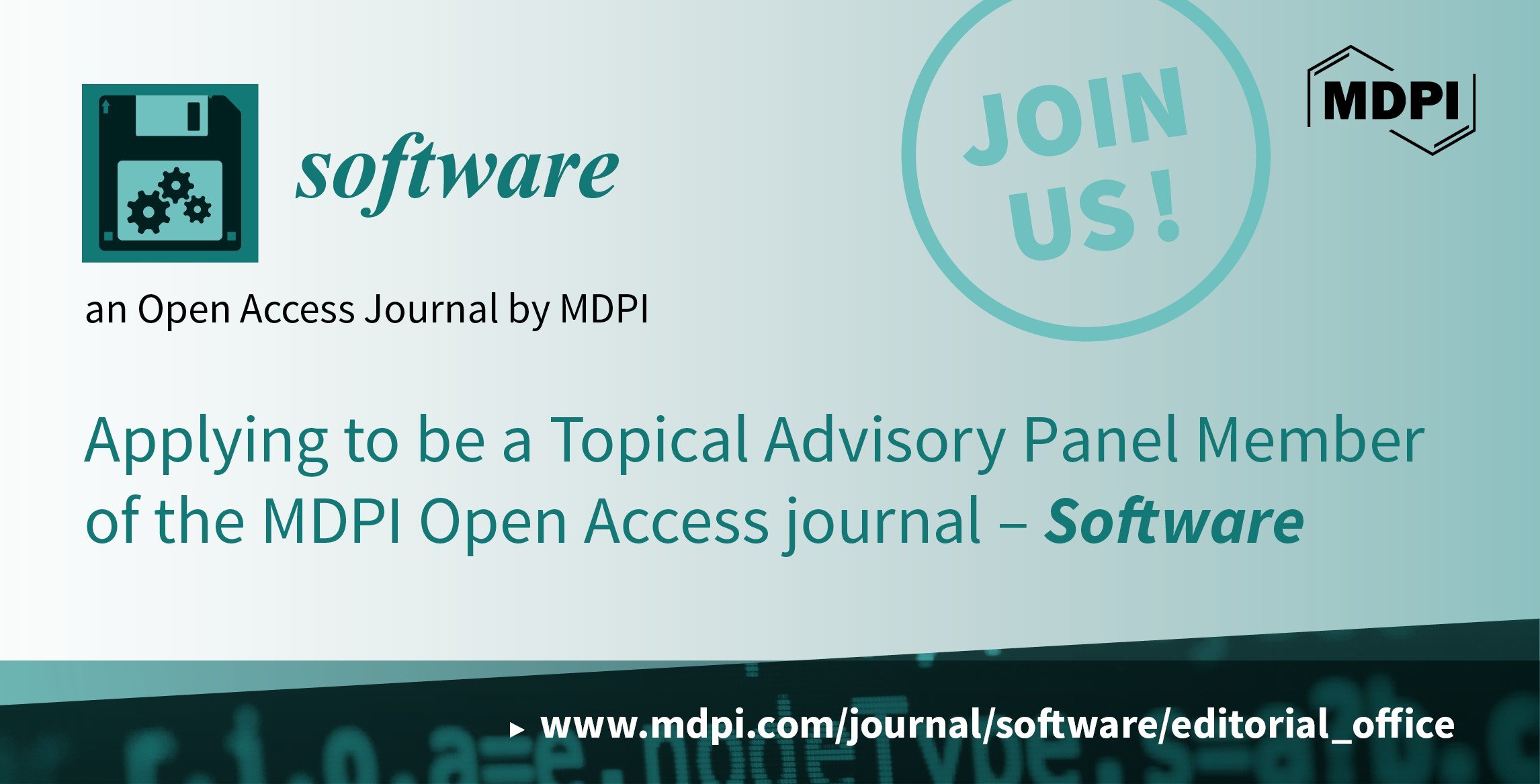
We are currently recruiting Topical Advisory Panel Members for the journal Software (ISSN 2674-113X). The main responsibility of these individuals is to regularly provide support to Guest Editors, Reviewer Board Members, and Editorial Board Members (https://www.mdpi.com/journal/software/editors).
Software is a peer-reviewed, open access journal containing research on software engineering, published quarterly online by MDPI. The aims and scope of the journal can be found on the following website: https://www.mdpi.com/journal/software/about.
The benefits of becoming a Topical Advisory Panel Member (TAP) include the following:
- Opportunity to publish one paper, with a certain discount, per year in Software, as well as potential discounts for additional papers you invite;
- Receiving a certificate in recognition of becoming a Topical Advisory Panel Member of Software;
- Software will offer additional sponsorships for conferences organized by Topical Advisory Panel Members;
- Travel grants of CHF 300–500 per year for conferences that you attend or organize.
The main responsibilities of the Topical Advisory Panel Members include the following:
- Providing regular reviews of manuscripts;
- Setting up at least one Special Issue (SI) in partnership with a senior researcher within two years of being appointed the role, and proposing a detailed strategy plan for the SI; the topic of the proposal is expected to be within the scope of the journal. The scope of the Special Issue should be broad enough to attract a reasonable number of submissions, but narrow enough to provide a cohesive collection of articles. The Special Issue should only cover a specific part of the scope of the journal;
- Providing a detailed strategy plan for the SI, including assisting in preparing the Special Issue/Topic titles, aim & scope, summary, and keywords; soliciting papers; promoting the SI;
- Providing support for the Special Issues/Topics related to your expertise when the Guest Editor(s) is/are not available. This includes SI promotion via social media and providing advice on some scientific cases;
- Promoting the journal at conferences (adding 1–2 slides into your presentation, distributing flyers, recommending the journal to your colleagues, etc.), on social media, and on other relevant platforms;
- Collaborating with the Editorial Board Members or the Editorial Office to promote high-quality/featured papers (for example, writing a summary or highlights of the Editor's selected papers).
To qualify as Topical Advisory Panel Member, applicants must:
- Have expertise and experience in a field related to the journal;
- Be within approximately 10 years of receiving a Ph.D.;
- Have at least 6–8 published papers in the last 5 years, as a first author or corresponding author;
- Currently hold an independent research position in academia or a government institute.
If you are interested in this position, please apply via the following link to apply: https://www.mdpi.com/journal/software/topical_advisory_panel_application, or send an email to software@mdpi.com with your academic CV. We look forward to hearing from you!
4 January 2022
Welcoming Dr. Li Li to the Editorial Board of Software
We are pleased to announce that Dr. Li Li has joined Software (ISSN: 2674-113X) as an Editorial Board Member.
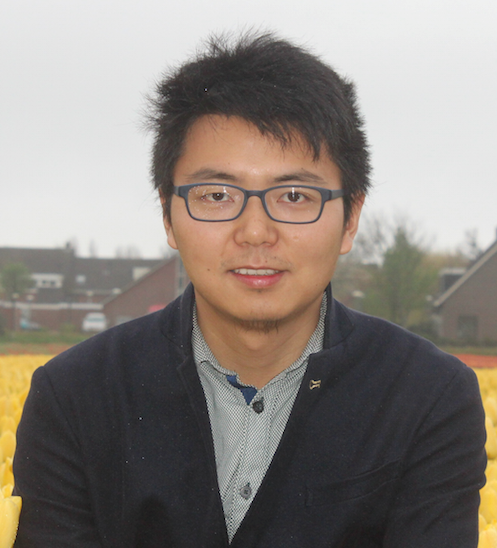
Dr. Li Li is currently a Senior Lecturer and Australia Research Council's Early Career Research (ARC DECRA) Fellow at Monash University, Australia. He received his Ph.D. in computer science and information technology in November 2016 under the supervision of Prof. Yves Le Traon (IEEE Fellow) from the University of Luxembourg.
His research interests include Mobile Software Engineering (MSE), Intelligent Software Engineering (ISE), and Software Security. To date, his research has led to 100+ publications in mostly top-tier SE journals, such as ACM Transactions on Software Engineering and Methodology (TOSEM) and IEEE Transactions on Software Engineering (TSE), and conferences, including IEEE/ACM International Conference on Software Engineering (ICSE), ACM Joint European Software Engineering Conference and Symposium on the Foundations of Software Engineering (ESEC/FSE), and IEEE/ACM International Conference on Automated Software Engineering (ASE). His publications have received in total 3800+ citations, with an H-index and H10-index at 28 and 60, respectively. His ICSE 2015 publication has received over 600 citations, being one of the most cited papers appearing in ICSE 2015. He has received multiple Best Paper Awards, including an ACM SIGPLAN Distinguished Paper Award in 2021, a Best Student Paper Award at The Web Conference in 2020, an ACM SIGSOFT Distinguished Paper Award in 2018, an MSR FOSS (Free, Open-Source Software) Impact Paper Award in 2018, and a Best Paper Award at SANER-ERA 2016. He has been ranked as the top-5 most impactful early-stage SE researchers in the world by two continuous bibliometric assessments of SE scholars concerning papers published from 2010 to 2017 and from 2013 to 2020, respectively.
He is an active member of the Software Engineering community and has contributed to (1) organizing many international conferences, such as Program Co-chair for the Doctoral Symposium Track of IEEE/ACM International Conference on Automated Software Engineering (ASE 2021), Program Co-chair for the ERA Track of International Conference on Software Analysis, Evolution and Reengineering (SANER 2020), Sponsorship Chair for IEEE/ACM International Conference on Automated Software Engineering (ASE 2020), Social Media Co-chair for IEEE/ACM International Conference on Program Comprehension (ICPC 2020), etc., and (2) guest-editing journal Special Issues, such as the "Automated Software Engineering for Mobile Applications" issue at the Automated Software Engineering Journal, (3) reviewing original submissions for journals, such as ACM Transactions on Software Engineering and Methodology (TOSEM) and IEEE Transactions on Software Engineering (TSE), and (4) participating in the program committee of premier conferences, including IEEE/ACM International Conference on Automated Software Engineering (ASE), IEEE International Conference on Software Maintenance and Evolution (ICSME), and IEEE International Symposium on Software Reliability Engineering (ISSRE).
For more details, please refer to Dr. Li Li's personal homepage: http://lilicoding.github.io/.
29 December 2021
Welcoming Dr. Eduardo Figueiredo to the Editorial Board of Software
We are pleased to announce that Dr. Eduardo Figueiredo has joined Software (ISSN: 2674-113X) as an Editorial Board Member.
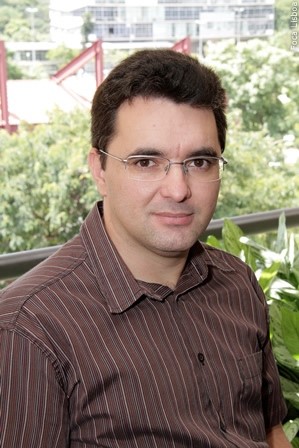
Dr. Eduardo Figueiredo has been an Associate Professor since 2010 and he is the head of the Software Engineering Laboratory (LabSoft) at the Federal University of Minas Gerais (UFMG) in Brazil. He received his Ph.D. in software engineering at Lancaster University (UK) in 2009 and was a visiting researcher at Carnegie Mellon University (CMU) in 2017. Eduardo also holds a B.Sc. degree (2004) in computer science from the Federal University of Ouro Preto (UFOP) and an M.Sc. degree (2006) in software engineering from the Pontifical Catholic University of Rio de Janeiro (PUC-Rio), Brazil.
His research interests include software reuse, configurable software systems, empirical software engineering, and source code analysis. He has published more than 100 peer-reviewed research papers in international journals and conferences, including IEEE Transactions on Software Engineering (TSE), Empirical Software Engineering (EMSE), the International Conference on Software Engineering (ICSE), and the Symposium on the Foundations of Software Engineering (FSE). He has also led numerous funded research projects in software design, software reuse, and the quality of configurable and adaptable software systems.
Dr. Eduardo Figueiredo has co-organised several conferences and workshops in software engineering-related areas, including the Ibero-American Conference of Software Engineering (CIbSE) in 2020, Brazilian Congress on Software (CBSoft) in 2015, two editions of the Workshop on Empirical Evaluation of Software Composition Techniques (ESCOT) in 2010 and 2011, and two editions of the Workshop on Assessment of Contemporary Modularization Techniques (ACoM) in 2007 and 2008. He has also served as a journal referee and program committee member of international venues, such as for ACM Transactions on Software Engineering and Methodology (TOSEM), IEEE Transactions on Software Engineering (TSE), the International Conference on Program Comprehension (ICPC), and the International Conference on Evaluation and Assessment in Software Engineering (EASE).
You can contact him at figueiredo@dcc.ufmg.br and http://www.dcc.ufmg.br/~figueiredo.
28 December 2021
Welcoming Prof. Dr. Daniela S. Cruzes to the Editorial Board of Software
We are pleased to announce that Prof. Dr. Daniela S. Cruzes has joined Software (ISSN: 2674-113X) as an Editorial Board Member.
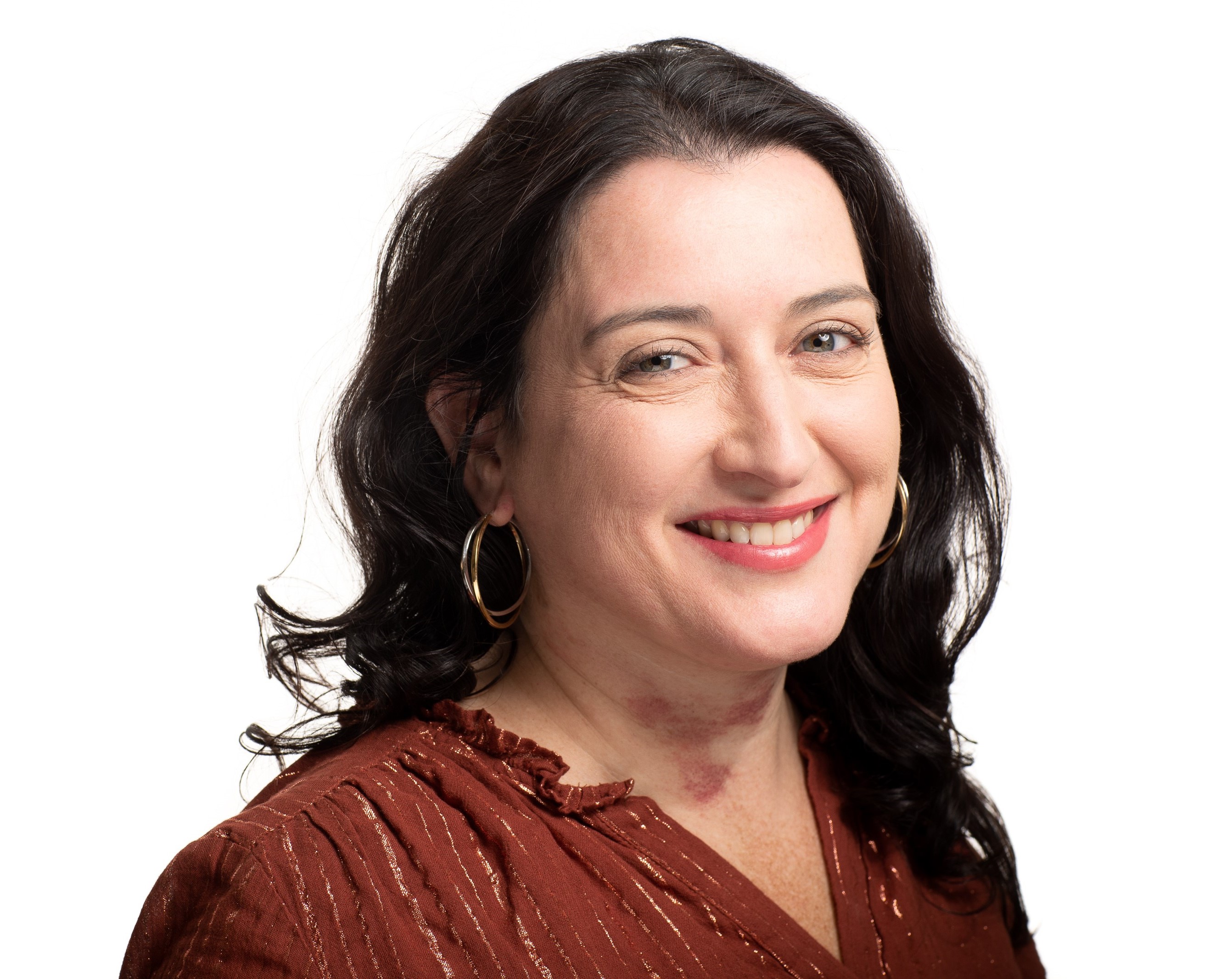
Dr. Daniela S. Cruzes is a Professor at the Norwegian University of Science and Technology (NTNU). In addition, she holds a part-time position in VISMA as Lead Security Researcher. Previously, she worked as a senior research scientist at SINTEF in Norway. She has also been a researcher fellow at the University of Maryland and Fraunhofer Center for Experimental Software Engineering-Maryland. Prof. Dr. Daniela Cruzes received her Ph.D. in experimental software engineering at the University of Campinas—UNICAMP in Brazil, in 2007.
Prof. Dr. Cruzes has published more than 100 research papers and book chapters. Her research interests are empirical software engineering, research methods and theory development, synthesis of SE studies, software security, software testing, agile software development processes, and DevOps.
We wish her every success in her new position, and we look forward to her contributions to the journal.
27 December 2021
Welcoming Prof. Dr. Paulo Ferreira to the Editorial Board of Software
We are pleased to announce that Prof. Dr. Paulo Ferreira has joined Software as an Editorial Board Member.

Prof. Dr. Paulo Ferreira holds a Ph.D. from the Université Pierre et Marie Curie (1996) in Systemes Informatiques with equivalence from the Technical University of Lisbon in Engenharia Informática e de Computadores (1997). His M.Sc. (1992) and B.Sc. (1988) are both from Instituto Superior Técnico (Technical University of Lisbon) in Electrotechnical Engineering. He has held the Habilitation from the same University since November 2009.
He is currently a Full Professor at the University of Oslo, where he supervises four Ph.D. students and several M.Sc. students and teaches two master-level courses (Fog Computing and Programming for Ubiquitous Things). Previously, he was with the Department of Computer Science and Engineering from the University of Lisbon, where he taught courses at both undergraduate and graduate levels, including Operating Systems, Mobile Computing, Middleware for Distributed Internet Applications, and Advanced Distributed Systems.
He led the Distributed Systems Group at INESC ID from 1999 to 2010 (and in alternating biennia since 2010). His interests and research work belong to the scientific area of operating systems and distributed systems, with an emphasis on middleware, large-scale, and mobile computing; and he has supervised 14 Ph.D. students and more than 70 M.Sc. students.
He coordinated and participated in many national and international projects (having been the EU coordinator of the H2020 TRACE project): Comandos, Harness, Broadcast, Flash, PerDIS, Timbus, C4E, TRACE, MoTiV (funded by European Union), OBIWAN, DGG-Rotor, Haddock-FS (funded by Microsoft Research), Mnemosyne, MobileTrans, Electronic Democracy, UbiRep, and novaVM (funded by the Portuguese science and technology foundation), etc. Prof. Dr. Ferreira has also served in many consultancy projects for private and public institutions (national and international) in the area of distributed systems (e.g., Java virtual machine, security).
Prof. Dr. Paulo Ferreira was Pro-Rector at the Technical University of Lisbon (UTL) between 2007 and 2010, responsible for the analysis and evaluation of existing information and communication systems.
He is the author or co-author of more than 130 peer-reviewed scientific communications, 1 book on operating systems (edited both in Portugal and Brazil), 1 book in distributed context-aware systems (edited by Springer), and has received 2 ACM/IFIP Middleware best paper awards. He has served on various program committees of top-level international conferences, and performed reviews for several international journals. He is a member of the Editorial Board of the Springer Journal of Internet Services and Applications, and he served as an expert to the European Union for the assessment of projects proposals under the 7th Framework Program. In addition, he was PC-Chair (with Liuba Shrira) of ACM/IFIP/Usenix Middleware 2018. He was one of the founders of EuroSys (ACM - European Chapter of the Special Interest Group on Operating Systems) and one of the officers and a member of the Steering Committee. Currently, he is a member of the Steering Committees of EuroSys, ACM/IFIP/Usenix Middleware (from 2011 to 2014 and since 2017), and a member of ACM/IFIP/Usenix Adaptive and Reflective Middleware (since 2014).
He was awarded the mention of “excellent teaching” four times, he is a senior member of ACM and IEEE, and he has received two Best Paper Awards at international events (ACM/IFIP/Usenix Middleware Conference).
24 December 2021
Welcoming Prof. Dr. Paolino Di Felice to the Editorial Board of Software
We are pleased to announce that Prof. Dr. Paolino Di Felice has joined Software as an Editorial Board Member.

Prof. Dr. Paolino Di Felice has been a Professor of Computer Science at the Department of Industrial and Information Engineering and Economics of the University of L'Aquila, Italy, since 1999.
He has (co-)authored about 120 articles appearing in (IEEE, ACM, and Elsevier) journals, books, and international conference proceedings. The main research topics investigated concerned geographical databases and software engineering. A relevant research topic belonging to the domain of geographical databases concerned the study of 2D spatial relations between spatial objects. Spatial relations constitute the kernel of spatial SQL running on top of the currently available DataBase Management Systems (e.g., Oracle, IBM-DB2, and PostgreSQL/PostGIS). His research work has been included in the Open Geospatial Consortium standards for the definition of 2D vector data types and topological operators.
His research in the domain of software engineering started in the mid 1980s. Topics studied concerned mathematical software, programming methodologies, code reusability, software indexing, and class library for geographic applications. More recently, his research focus has moved to code generation of MVC web applications using the model-driven architecture and the assessment of the quality of the generated code. Currently, his group is developing a software tool supporting the automatic feeding of the Metadata Repository about UML Class Diagrams.
Prof. Dr. Di Felice has carried out a consistent activity of technological transfer in collaboration with several Italian IT firms. His research has been funded by national and international institutions and carried out in collaboration with researchers of several countries (Italy, Holland, Germany, Canada, and the USA). He has served regularly within national and international committees.
Prof. Dr. Di-Felice’s research and publications have received many citations in the research community. His Scopus data are the following: h-index 16, number of citations 1720 (https://www.scopus.com/authid/detail.uri?authorId=35613348600); while the Google Scholar citation results are above 4000 (https://scholar.google.it/citations?&user=GP6_bRUAAAAJ).
22 December 2021
Welcoming Dr. Andreas L. Symeonidis to the Editorial Board of Software
We are pleased to announce that Dr. Andreas L. Symeonidis has joined Software as an Editorial Board Member.

Dr. Andreas L. Symeonidis is an Associate Professor with the Department of Electrical and Computer Engineering at the Aristotle University of Thessaloniki, Greece, and the Chief Research Officer at Cyclopt.com. His research interests include software engineering processes, model-driven engineering, software quality and software analytics, middleware robotics, and knowledge extraction from big data repositories. Dr. Symeonidis’ work has been published in over 150 journal articles, book chapters, and conference publications. He is co-author of the books “Agent Intelligence through Data Mining” (Springer publishing), “Mining Software Engineering Data for Software Reuse” (Springer publishing), and “Practical Machine Learning in R” (Leanpub publishing). He is currently coordinating more than 10 contract R&D projects, while serving occasionally as an R&D project evaluator and reviewer for the European Commission.
You can see more at: http://users.auth.gr/symeonid.
21 December 2021
Welcoming Prof. Dr. Francisco José García-Peñalvo to the Editorial Board of Software
We are pleased to announce that Prof. Dr. Francisco José García-Peñalvo has joined Software as an Editorial Board Member.

Prof. Dr. Francisco José García-Peñalvo is a Full Professor at the Department of Computer Science and Automation at the University of Salamanca (USAL), with three six-year periods of research, one six-year period of transferring and innovation, and four five-year periods of recognized teaching. He received the Gloria Begué award for teaching excellence in 2019. He was also a Distinguished Professor at the School of Humanities and Education at the Tecnológico de Monterrey, Mexico, and a Researcher of International Impact at the Universidad Nacional San Agustín, Arequipa, Peru. Since 2006 he has been the head of the Research Group Recognized by the USAL GRIAL (research GRoup on InterAction and eLearning), a group that is a Consolidated Research Unit of the Junta de Castilla y León Government (UIC 81). He was included in the University of de Stanford’s World's Top 2% Scientists list (2021) https://doi.org/10.17632/btchxktzyw.3. He was the Vice-Dean of Innovation and New Technologies of the Faculty of Sciences of the USAL between 2004 and 2007 and the Vice-Rector of Technological Innovation of this University between 2007 and 2009. He is currently the Rector's Delegate for Virtual Teaching and the Coordinator of the Doctorate Program in Education in the Knowledge Society at USAL. He is the Editor-in-Chief of the journals Education in the Knowledge Society and Journal of the Information Technology Research, and Associate Editor of many journals, with a special mention to the journal Computers in Human Behavior Reports. He has published more than 100 research papers in JCR-indexed journals (53 Q1).
For more detailed information on his publications, these are the public links to his profiles in Google Scholar (http://goo.gl/sDwrr0), Publons (https://bit.ly/2u2FN5l) and ORCID (http://orcid.org/0000-0001-9987-5584).




